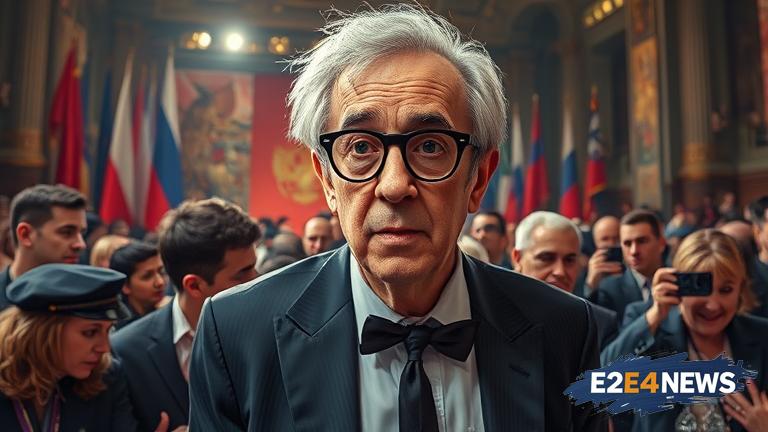Woody Allen, the renowned American filmmaker, has been embroiled in a fresh controversy following his appearance at a Russian film festival. The event, which took place in late August, was met with widespread criticism, with many condemning Allen’s decision to participate in the festival. The backlash against Allen’s appearance is largely due to the ongoing controversy surrounding his personal life, including allegations of child abuse and his marriage to his former adopted daughter. Despite the criticism, Allen has responded to the backlash, stating that he is an artist and not a politician, and that his appearance at the festival was solely to promote his work. However, many have argued that Allen’s actions are not just about promoting his art, but also about supporting the Russian government, which has been accused of human rights abuses and aggression towards Ukraine. The Russian film festival, which has been running for several years, has been criticized for its ties to the Russian government and its alleged propaganda efforts. Allen’s appearance at the festival has been seen as a propaganda coup for the Russian government, which has been seeking to promote its cultural and artistic achievements despite its pariah status on the international stage. The controversy surrounding Allen’s appearance has sparked a wider debate about the role of artists and cultural figures in promoting or condemning political regimes. Many have argued that artists have a responsibility to speak out against human rights abuses and to use their platforms to promote social justice. Others have argued that artists should be free to create and promote their work without being politicized or pressured into taking a stance on controversial issues. The backlash against Allen’s appearance has also highlighted the ongoing controversy surrounding his personal life, including allegations of child abuse and his marriage to his former adopted daughter. Allen has consistently denied the allegations, but they have continued to dog his career and public image. Despite the controversy, Allen remains a highly respected and influential figure in the film industry, with a career spanning decades and numerous awards and accolades. His appearance at the Russian film festival has sparked a renewed debate about his legacy and the impact of his personal life on his professional career. The controversy has also raised questions about the ethics of cultural exchange and collaboration, particularly in cases where artists or cultural figures are seen as supporting or promoting authoritarian or repressive regimes. As the debate continues to rage, it remains to be seen how Allen’s appearance at the Russian film festival will impact his career and public image in the long term. The incident has also sparked a wider conversation about the role of artists and cultural figures in promoting social justice and human rights, and the challenges of navigating complex political and ethical issues in the public eye. In recent years, there has been a growing trend towards greater accountability and scrutiny of artists and cultural figures, with many facing backlash and criticism for their actions and statements. The controversy surrounding Allen’s appearance at the Russian film festival is just the latest example of this trend, and highlights the need for artists and cultural figures to be aware of the impact of their actions and to take responsibility for their role in promoting social justice and human rights. The incident has also sparked a renewed debate about the importance of cultural boycotts and the impact of cultural exchange on political regimes. While some have argued that cultural boycotts are an effective way to pressure governments and promote social change, others have argued that they can be counterproductive and harm innocent people. As the debate continues to rage, it remains to be seen how the controversy surrounding Allen’s appearance at the Russian film festival will impact the wider conversation about cultural exchange and collaboration. The incident has also raised questions about the role of film festivals and cultural events in promoting social justice and human rights, and the challenges of navigating complex political and ethical issues in the cultural sphere. In recent years, there has been a growing trend towards greater diversity and inclusivity in film festivals and cultural events, with many seeking to promote social justice and human rights through their programming and activities. The controversy surrounding Allen’s appearance at the Russian film festival highlights the need for film festivals and cultural events to be aware of the impact of their actions and to take responsibility for their role in promoting social justice and human rights. The incident has also sparked a wider conversation about the importance of accountability and transparency in the cultural sphere, and the need for artists and cultural figures to be aware of the impact of their actions and to take responsibility for their role in promoting social justice and human rights. As the debate continues to rage, it remains to be seen how the controversy surrounding Allen’s appearance at the Russian film festival will impact the wider conversation about cultural exchange and collaboration, and the role of artists and cultural figures in promoting social justice and human rights.
